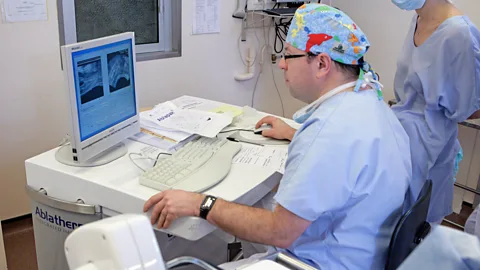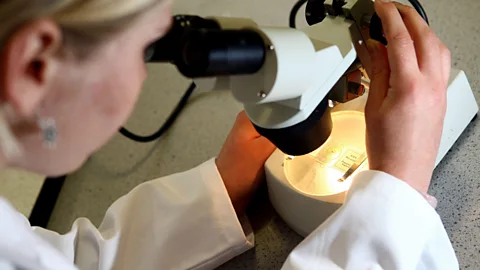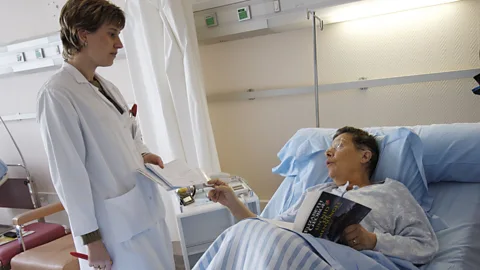Why age matters when it comes to cancer
 Alamy
AlamyScientists are beginning to understand why our cancer risk increases as we get older. Now it's hoped that this could one day lead to new treatments.
King Charles' cancer diagnosis may have sent shockwaves around the world over the past few days, not least because of Buckingham Palace's unusually candid disclosure. But many experts have taken the opportunity to raise awareness of the increased cancer risk that older people face.
The steady march of time has long been known to be one of the greatest risk factors for developing cancer. According to the US National Cancer Institute, the average age of cancer onset is 66, while more than half of all new UK cancer cases are in those aged 70 and older.
There are many reasons for this. The first and simplest is that as we pass through life, we progressively accumulate more damage to the DNA in our cells due to a breadth of factors. Some of the most common include exposure to UV rays, chronic inflammation, environmental toxins, consuming alcohol and smoking, and microbial infections. But over time, our cells become less efficient at repairing this damage, leading to accumulating DNA mutations in a tissue-specific manner. The more mutations that build up in our body, the greater the risk of uncontrolled cell division, or cancer.
"Basically, the repair mechanisms that might prevent the onset of changes that lead to cancer, are in decline as we age," says Richard Siow, director of ageing research at King's College London in the UK. "As we age, the balances that maintain normal cellular function go into decline."
Studies have also found that these accumulating mutations impair the ability of immune cells to suppress and destroy cancer cells. In particular, Masashi Narita, who researches cancer and ageing at the University of Cambridge, points to a particularly well-known molecular pathway known as p53, which is involved in suppressing tumours. However, the efficacy of this pathway declines as we age, due to gathering mutations in the p53 gene.
 Alamy
AlamyWhen various gene mutations occur in blood stem cells, they induce them to progressively expand in size over time, something which biologists have dubbed clonal hematopoiesis. This is very rare in the young but more common in older people, and it can have two major consequences. The first is an increased risk of blood cancers, and the second is to alter the function of various immune cells such as monocytes, macrophages, and lymphocytes, all of which arise from blood stem cells.
Narita and his research group have been experimenting with various cancer-causing gene mutations which become more common with age, to try and understand what happens to the human body. "We take one of these genes, introduce it into an adult animal and examine what happens at the single-cell level," he says.
He and his team have already found that this seems to trigger a rise in cellular senescence – which is when old and damaged cells cease to divide and grow. An excessive accumulation of senescent cells can modulate their surrounding environment in numerous harmful ways, triggering chronic inflammation which can cause further damage and increase susceptibility to cancer.
But these processes are still just a small handful of the ways in which ageing might impact cancer risk. Other new theories, ones which are even wilder and weirder, are already beginning to emerge.
Cells losing their memory
Just as human memory declines with age, making us increasingly forgetful and prone to lapses, some cancer biologists suspect that individual cells might also lose their memory over time and forget how to behave correctly.
Luca Magnani, an epigeneticist at the Institute of Cancer Research in the UK, says that this is a working theory for breast cancer, potentially triggered by the hormonal changes which begin in menopause. According to the NHS, eight out of 10 cases of breast cancer occur in women over the age of 50.
"A common hypothesis that is forming in the field is that these cells are losing their memory and begin proliferating even if they aren't supposed to," says Magnani.
One of the ideas for why this might happen, not just in breast cancer but many other age-related cancers, is that over the course of a lifetime, your genome becomes less stable at transmitting information. This is a result of so-called epigenetic changes or genetic modifications that impact gene activity without changing the DNA sequence.
 Getty Images
Getty Images"Information is transmitted in a less coherent and reliable way as you get older," says Andy Feinberg, an epigenetics and cancer professor at Johns Hopkins Medicine in Baltimore, Maryland. "There's more noise and that leads to more randomness or uncertainty about the pattern of which genes are supposed to be on and which are supposed to be off. It's been shown that the parts of the genome that have this increased noise, they're more likely to undergo changes that are carcinogenic."
But these ideas could also lead to completely new ways of tackling cancer. One of the most active realms of cancer drug development is small molecules which attempt to address the deleterious effects of mutations in the p53 pathway and restore its normal tumour-suppressing functions.
Feinberg believes that the more we understand how epigenetics contribute to these increased noise and randomness, we might be able to find ways to reverse these changes. "The encouraging thing is that epigenetic changes are sort of by definition, reversible," he says.
Anti-ageing scientists are currently conducting early-stage clinical trials exploring various chemical cocktails which selectively kill and remove senescent cells without damaging healthy tissue. Known as senolytics, they include an antioxidant called fisetin, a grape seed extract called polyphenol procyanidin C1, and the drug Dasatinib in combination with another natural chemical named quercetin.
At the moment, trials are testing some of these senolytics on frail, elderly individuals who have survived a previous battle with cancer to see whether they can boost their immune function and general health. If successful, they may have wider applications.
Siow is optimistic that research into newer treatment options which could reverse age-related changes and boost a person's health-span – the number of years that a person is healthy – could make a huge difference to population health in the years to come.
"The aim is also to reduce the healthcare economic burden," he says. "…The care infrastructure is going to be really expensive because populations are living longer with disease."
--
If you liked this story, sign up for The Essential List newsletter – a handpicked selection of features, videos and can't-miss news delivered to your inbox every Friday.
